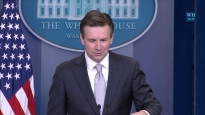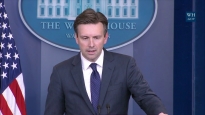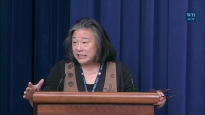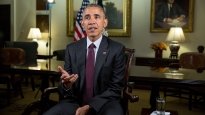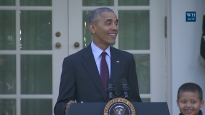President Obama Speaks on Helping Homeowners
February 01, 2012 | 19:09 | Public Domain
President Obama discusses a proposal to help more responsible homeowners refinance their mortgages at today’s historically low interest rates.
Remarks by the President on Housing
James Lee Community Center
Falls Church, Virginia
11:05 A.M. EST
THE PRESIDENT: Hello, everybody! (Applause.) Thank you so much. Thank you. (Applause.) Thank you so much. Everybody please have a seat. Have a seat. It is great to be back in Falls Church. (Applause.) Thank you for having me.
Last week, in my State of the Union, I laid out my blueprint for an economy that’s built to last. And I want to assure you I am not going to go over the whole thing again this morning. (Laughter.) That was a long speech. I'm not going to repeat the whole thing. (Laughter.) But I do want to talk about some of the issues that I discussed last week because the blueprint we put forward was one that focuses on restoring what have always been this country's greatest strengths -- American manufacturing, American energy, skills and education for American workers so that we can compete with anybody around the world in this 21st century economy, and most importantly, the American values of fairness and responsibility. Fairness and responsibility. (Applause.)
Now, we know what happens, because we've just seen it -- what happened when we stray from those values. We saw what happened over the past decade when we strayed from those values -- especially when it comes to the massive housing bubble that burst and hurt so many people. Millions of families who did the right and the responsible thing, folks who shopped for a home that they could afford, secured a mortgage, made their payments each month -- they were hurt badly by the irresponsible actions of other people who weren’t playing by the same rules, weren’t taking the same care, weren’t acting as responsibly. By lenders who sold loans to people who they knew couldn’t afford the mortgages; and buyers who bought homes they knew they couldn’t afford; and banks that packaged those mortgages up and traded them to reap phantom profits, knowing that they were building a house of cards.
It was wrong. It was wrong. It triggered the worst economic crisis of our lifetimes. And it has been the single biggest drag on our recovery from a terrible recession. Crushing debt has kept millions of consumers from spending. A lack of building demand has kept hundreds of thousands of construction workers idle. Everybody involved in the home-building business -- folks who make windows, folks who make carpets -- they've all been impacted. The challenge is massive in size and in scope, because we've got a multitrillion-dollar housing industry. And economists can tell you how it’s affected all sorts of statistics, from GDP to consumer confidence.
But what’s at stake is more than just statistics. It’s personal. I’ve been saying that this is a make-or-break moment for the middle class. And this housing crisis struck right at the heart of what it means to be middle class in America: our homes -- the place where we invest our nest egg, place where we raise our family, the place where we plant roots in a community, the place where we build memories.
It’s personal. It affects so much of how people feel about their lives, about their communities, about the country, about the economy. We need to do everything in our power to repair the damage and make responsible families whole again. Everything we can. (Applause.)
Now, the truth is it’s going to take more time than any of us would like for the housing market to fully recover from this crisis. This was a big bubble, and when it burst it had a big effect. Home prices started a pretty steady decline about five years ago. And government certainly can’t fix the entire problem on its own. But it is wrong for anybody to suggest that the only option for struggling, responsible homeowners is to sit and wait for the housing market to hit bottom. (Applause.) I refuse to accept that, and so do the American people.
There are more than 10 million homeowners across the country right now who, because of an unprecedented decline in home prices that is no fault of their own, owe more on their mortgage than their homes are worth. It means your mortgage, your house is underwater.
Here in Falls Church, home values have fallen by about a quarter from their peak. In places like Las Vegas, more than half of all homeowners are underwater. More than half. So it’s going to take a while for those prices to rise again. But there are actions we can take right now to provide some relief to folks who've been responsible, have done the right thing, and are making their payments on time.
Already, thanks to the outstanding work, in part, of my Secretary of Housing and Urban Development, Shaun Donovan, who's here today -- (applause) -- yes, there he is, the good-looking guy in the front here. (Laughter.) The housing plan we launched a couple years ago has helped nearly 1 million responsible homeowners refinance their mortgages, and they’re saving an average of $300 on their payments each month -- $300 -- which is great. (Applause.)
But I’ll be honest -- the programs that we put forward haven’t worked at the scale that we hoped. Not as many people have taken advantage of it as we wanted. Mortgage rates are as low as they’ve been in half a century, and when that happens, usually homeowners flock to refinance their mortgages -- so a lot of people take advantage of it and save a lot of money. But this time too many families haven’t been able to take advantage of the low rates, because falling prices lock them out of the market. They were underwater; made it more difficult for them to refinance.
Then you’ve got all the fees involved in refinancing. And a lot of people just said, you know what, even though I’d like to be, obviously, cutting down my monthly payment, the banks just aren’t being real encouraging.
So last year we took aggressive action that allowed more families to participate. And today we’re doing even more. This is the main reason I’m here today. (Applause.)
As I indicated at the State of the Union last week, I am sending Congress a plan that will give every responsible homeowner in America the chance to save about $3,000 a year on their mortgage by refinancing at historically low rates. (Applause.) No more red tape. No more runaround from the banks. And a small fee on the largest financial institutions will make sure it doesn’t add to our deficit.
I want to be clear: This plan, like the other actions we’ve taken, will not help the neighbors down the street who bought a house they couldn’t afford, and then walked away and left a foreclosed home behind. It’s not designed for those who’ve acted irresponsibly, but it can help those who’ve acted responsibly. It’s not going to help those who bought multiple homes just to speculate and flip the house and make a quick buck, but it can help those who’ve acted responsibly.
What this plan will do is help millions of responsible homeowners who make their payments on time but find themselves trapped under falling home values or wrapped up in red tape.
If you’re ineligible for refinancing just because you’re underwater on your mortgage, through no fault of your own, this plan changes that. You’ll be able to refinance at a lower rate. You’ll be able to save hundreds of dollars a month that you can put back in your pocket. Or you can choose those savings to rebuild equity in your homes, which will help most underwater homeowners come back up for air more quickly.
Now, to move this part of my plan, we’re going to need Congress to act. We’re going to need Congress to act. I hear some -- (laughter) -- murmuring in the audience here. We need them to act. But we’re not just going to wait for Congress. We’re going to keep building a firewall to prevent the same kinds of abuses that led this crisis -- led to this crisis in the first place. So there are things we can do administratively that are also going to help responsible homeowners. (Applause.)
Already, we’ve set up a special task force I asked my Attorney General to establish to investigate the kind of activity banks took when they packaged and sold risky mortgages. (Applause.) And that task force is ramping up its work as we speak. We’re going to keep at it and hold people who broke the law accountable and help restore confidence in the market. We’re going to speed assistance to homeowners. And we’re going to turn the page on an era of recklessness that hurt so many hardworking Americans. (Applause.)
Today, I’m also proposing a Homeowners Bill of Rights -- one straightforward set of common-sense rules of the road that every family knows they can count on when they’re shopping for a mortgage. No more hidden fees or conflicts of interest. No more getting the runaround when you call about your loan. No more fine print that you used to get families to take a deal that is not as good as the one they should have gotten. New safeguards against inappropriate foreclosures. New options to avoid foreclosure if you’ve fallen on hardship or a run of bad luck. (Applause.) And a new, simple, clear form for new buyers of a home. (Applause.)
Now, think about it. This is the most important purchase a family makes. But how many of you have had to deal with overly complicated mortgage forms and hidden clauses and complex terms? I remember when Michelle and I bought our first condo -- and we're both lawyers. (Laughter.) And we’re looking through the forms and kind of holding it up -- (laughter) -- reading it again -- "What does this phrase mean?" And that’s for two trained lawyers. The forms, the confusion, the potential for abuse is too great just because the forms were too complicated.
So this is what a mortgage form should look like. This is it. (Applause.) Now that our new consumer watchdog agency is finally running at full steam -- (applause) -- now that Richard Cordray is in as the Director of the Consumer Finance Protection Bureau -- (applause) -- they’re moving forward on important protections like this new, shorter mortgage form. Simple, not complicated. Informative, not confusing. Terms are clear. Fees are transparent.
This, by the way, is what some of the folks in Congress are trying to roll back and prevent from happening.
AUDIENCE: Booo --
THE PRESIDENT: I guess they like complicated things that confuse consumers and allow them to be cheated. I prefer actions that are taken to make things simpler and easier to understand for consumers -- (applause) -- so that they can get the best deal possible, especially on the biggest single investment that most people will ever make. (Applause.)
Americans making a down payment on their dreams shouldn’t be terrified by pages and pages of fine print. They should be confident they’re making the right decision for their future.
There’s more that we’re announcing today. We’re working to turn more foreclosed homes into rental housing, because as we know and a lot of families know, that empty house or “for sale” sign down the block can bring down the price of homes across the neighborhood. We’re working to make sure people don’t lose their homes just because they lose their jobs. These are steps that can make a concrete difference in people’s lives right now. (Applause.)
As I said earlier, no program or policy will solve all the problems in a multitrillion-dollar housing market. The heights of the housing bubble reached before it burst, those were unsustainable, and it’s going to take time to fully recover. That requires everybody to do their part.
As much as our economic challenges were born of eroding home values and portfolio values, they were also born of an erosion of some old-fashioned American values. An economy that’s built to last, that’s on a firm foundation, so that middle-class families have a sense of security and those who want to get in the middle class can make it if they’re working hard -- that demands responsibility from everyone.
Government must take responsibility for rules that are fair and fairly enforced. (Applause.) Banks and lenders must be held accountable for ending the practices that helped cause this crisis in the first place. (Applause.) And all of us have to take responsibility for our own actions -- or lack of action. (Applause.)
So I urge Congress to act. Pass this plan. Help more families keep their homes. Help more neighborhoods remain vibrant. Help keep more dreams defended and alive. And I promise you that I’ll keep doing everything I can to make the future brighter for this community, for this commonwealth, for this country.
Thank you, everybody. God bless you. God bless the United States of America. Thank you. (Applause.)
END
11:24 A.M. EST
|
November 30, 2016
|
November 29, 2016
|
November 29, 2016
|
November 28, 2016
|
|
November 28, 2016
|
November 25, 2016
|
November 24, 2016
|
November 23, 2016
|
- &lsaquo previous
- …
- 5
- 6
- 7
- 8
- 9
- 10
- 11
- 12
- 13
- …
- next &rsaquo

